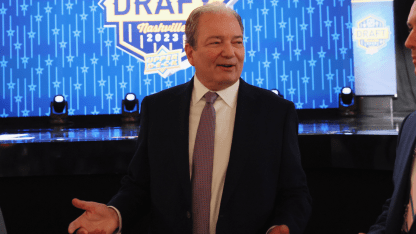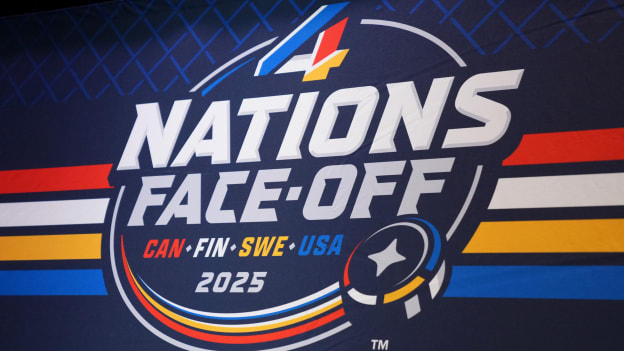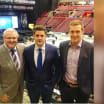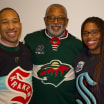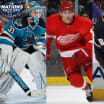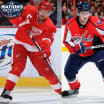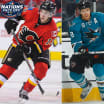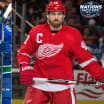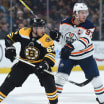In NHL.com’s Q&A feature called “Sitting Down with …” we talk to key figures in the game, gaining insight into their lives on and off the ice. In this edition, we feature Ray Shero, a senior adviser to the general manager for the Minnesota Wild.
Ray Shero spent 13 seasons as an NHL general manager, with the Pittsburgh Penguins from 2006-14 and the New Jersey Devils from 2015-20. He also served on the United States management team for two Olympics, in 2010 in Vancouver and in 2014 in Sochi.
Now the 62-year-old is in his fourth season as senior adviser to Minnesota Wild GM Bill Guerin, whom he acquired as a player in 2008-09 and hired as a development coach in 2011-12 in Pittsburgh. Guerin is in his sixth season as GM of the Wild and is also GM of the United States for the 4 Nations Face-Off.
Asked if he would like to be an NHL GM again, Shero said, “I would never say never.” But he made it clear he is happy doing what he is doing, watching young people seize opportunities and grow in an evolving game.
“Pay it forward,” Shero said. “That’s very satisfying, because that was me at one point, right?”
In an interview with NHL.com, Shero shared thoughts on Guerin, the Wild, the United States and the future of the NHL, predicting the League will have a female head coach.
What did you see in Guerin when you acquired the then-38-year-old forward for the Penguins from the New York Islanders on March 4, 2009?
“We watched him a lot leading up to the Trade Deadline, and every one of my guys came back and said, ‘He can’t play.’ I kept in touch with [Islanders GM] Garth Snow. I know Garth had actually had a deal with another team, but the team didn’t have the salary cap space. I said, ‘I’m going to call Garth Snow back, and if he’ll do this, I’m going to do it.’ That was the only time I said, ‘Guys, I appreciate your opinion, but I’ve got to make the final decision. It’s worth the risk.’ That ended up being one of my best trades.
“It all came together because of that deadline. We added Billy and Chris Kunitz. It’s not very often you can get two players at the deadline that pop on your first line with Sidney Crosby and have the success they did together.
“As a player, Billy had a certain way about him. Everybody knows Billy’s a really funny guy, but he’s got a real serious side to him too. As a player, there’s a time to have fun. There’s a time to loosen up these young guys that were taking so much on. They had just gone to the Stanley Cup Final the year before. Billy comes in, he’s got some gray in the beard, he's joking around and this and that, but when it came time to play, man, he could play, and he played hard. We won the Stanley Cup, and he had so much to do with that.”
After Guerin finished his playing career in Pittsburgh in 2009-10, why did you hire him as a development coach for the Penguins in 2011-12? How did that start his career as an executive?
“In my 13 years as a GM, the hardest phone call I ever made was to Billy to let him know I wouldn’t be re-signing him. I’m sure that was devastating for him. Billy could tell, I’m sure, how hard that was for me. He went to Philadelphia on a tryout after that. That didn’t work out. He reached out maybe a month after the Flyers camp, and we talked.
“I remember saying to him, ‘What I don’t want to do is just give someone a job and a paycheck.’ It was on the locker room walls for a lot of years in Pittsburgh, even after I left: ‘Passion. Accountability. Work ethic.’ That was not just players. That was what I looked for in staff as well. My recommendation was to take a year with the family and be a dad, and he did that. He called me later. It was really surprising to me. ‘We’re going to move back to Pittsburgh.’
“It’s like any other company. You have a training program. I think the first year was really good, because he did a lot of job shadowing with Tom Fitzgerald [then assistant GM in Pittsburgh, now GM in New Jersey], learning what the job really is. I think that was beneficial to him. ‘Fitzy’ was really great with him. They’ve had a great relationship.
“Billy’s got the passion for the game. That was evident for a long time. Billy didn’t have to play the way he played. I mean, he could get by on his skating, skill and size, his shot. But he was a fierce competitor, and he fought. I’m really proud of him and happy for him that he’s had success away from the game as well.
“The GM job now is a tough job. It’s great to be able to back with Billy, knowing what he’s about as a person and how he cares about the players and families. His experiences both on and off the ice have really helped a lot of people. He’s got a lot of good people. It’s really good to be able to contribute to that.”
How has Guerin grown as a GM?
“He played and worked for people like Jerry York, Lou Lamoriello, Harry Sinden, Glen Sather and Jim Rutherford. That experience has really benefited him. He has a really good eye for players and talent. In terms of a team identity, he knows what he wants, kind of what he was as a player and what he sees as a winning culture both on and off the ice. I think being a leader as a general manager, the communication part to your staff is, ‘Here’s our identity.’ He’s good like that.
“Like with anything, every year you’re growing as a GM. There’s a certain confidence you get in doing the job, and that comes from experience, and that comes from making some good decisions. Obviously, general managers will make some not-so-good decisions, but you limit your mistakes. I think he’s got a really good grasp of a lot of different things.”
What’s your take on the Wild this season?
“John Hynes and his coaching staff have done a really great job from the first day of training camp. Kirill Kaprizov reminds me of Crosby to a certain extent. His strength on pucks, his ability to create things, his competitiveness is really off the charts. Of course, he’s our MVP and could be MVP of the League. Our goaltending has been good. Obviously, Filip Gustavsson has bounced back from last year, and Marc-Andre Fleury has been real sharp.
“Obviously, Brock Faber’s been a great revelation. We’ve gotten bounce-back years from Freddy Gaudreau and Marcus Johansson. Captain Jared Spurgeon missed most of last year, and this guy is such a good player. Jonas Brodin is a really great player. He missed games last year.
“Joel Eriksson Ek, wow, this kid. He really reminds me of a Travis Zajac, really does all the hard work, the harder matchups. It helps you win. I couldn’t be more impressed with a guy like him. Last year was a coming out party for Marco Rossi, and this year he’s one of our best players again. He’s a competitive guy. He reminds me of Nico Hischier in terms of how he plays. He’s defensively responsible. He’s not the biggest guy, but a lot of his goals are coming around the net because he’s there. He battles. He’s got a great stick. It’s hard to find guys like that at center ice.
“We’ve got skill, but there’s an identity to the team, how we play. It’s a heavy team. It’s got size. There’s a lot of good things going on.
“It's a fun group to watch. If people haven’t seen a game in St. Paul, it’s an amazing place. It’s packed every night, and they’re a great fan base. They’ve had something to cheer about, and hopefully that can continue.”
